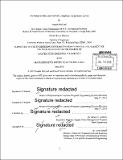The impact of SKU and network complexity on inventory levels
Author(s)
McCord, Joseph (Joseph Cole); Novoa Garnica, David
DownloadFull printable version (4.983Mb)
Alternative title
Impact of stockkeeping unit and network complexity on inventory levels
Other Contributors
Massachusetts Institute of Technology. Engineering Systems Division.
Advisor
Bruce C. Arntzen.
Terms of use
Metadata
Show full item recordAbstract
Many firms introduce new distinct products more quickly than they remove old products, and some firms have also established larger distribution networks to increase service levels or support new markets. This research applies ordinary least-squares regression and a simulation approach to identify the relationship between increased complexity and inventory levels relative to demand for a major fast-moving consumer goods company. For this research complexity is defined as the number of SKUs in a brand and the number of stocking locations for an SKU. We find that while increased complexity does translate into increased demand variability, it does not correspond to higher inventory levels. While this research does not isolate the exact reason for this disconnect, it could relate to the degree to which inventory targets recommended by an optimization software are adhered to by planning staff. For similar companies which are navigating inventory cost and complexity pressures, the research implies that there may not be a direct relationship if the company does not strictly execute an inventory policy which bases safety stock levels on forecast error.
Description
Thesis: M. Eng. in Logistics, Massachusetts Institute of Technology, Engineering Systems Division, 2015. Cataloged from PDF version of thesis. Includes bibliographical references (page 42).
Date issued
2015Department
Massachusetts Institute of Technology. Engineering Systems DivisionPublisher
Massachusetts Institute of Technology
Keywords
Engineering Systems Division.